How Often Do I Really Need To Change My Air Filter
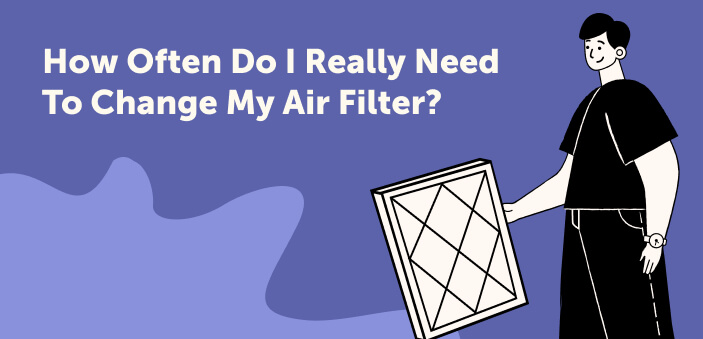
Replacing the filter in your air conditioning or heating system regularly keeps your system running efficiently, and most importantly, maintains quality air in your home. Other than ensuring a high-efficiency level, it serves to lower your energy bills.
Sadly, most homeowners forget to change air filters for several months. This can cause a significant increase in energy bills and other maintenance costs, as well as poor health for the home's occupants.
Read on to find out how often to change an air filter in your home.
What Are Air Filters, and What Are They Used For?

Air filters are electronic devices used in homes, offices, or any enclosed space to regulate temperature, pick up dirt and allergens, and control humidity. Invented in 1902 by Willis Carrier, air filters work by transferring unwanted components in the air from indoor spaces to outdoor spaces.
The terms AC and HVAC are often used interchangeably. AC simply refers to air conditioning, while HVAC refers to heating, ventilation, and air conditioning. The major difference between the two is that HVAC has added features like gas furnaces, heat pumps, and air conditioning. Additionally, HVAC’s work includes ductwork and ventilation.
General Recommendations on How Often To Change an Air Filter
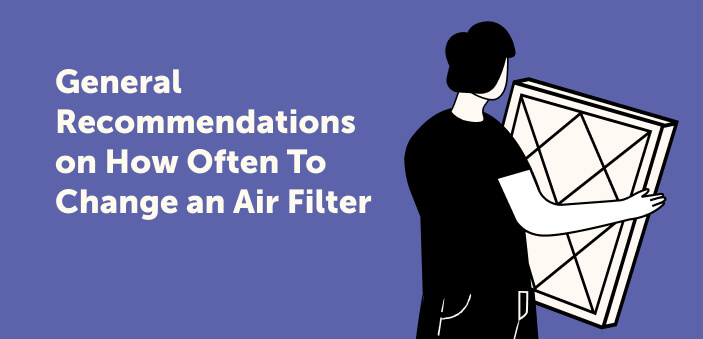
There's no definite answer when it comes to how often to change air filter. This is because the frequency of replacing an air filter depends on various factors.
However, experts recommend changing once every 30 days if your air filter is made of fiberglass filters, which are relatively poor quality. On the other hand, big-ticket pleated filters can do well with a replacement once every three months or six months.
Failure to replace an air filter will mean that the home appliance will attract more particles from the surrounding air, resulting in inefficiency.
Here are some of the factors that determine the frequency in which you should change an air filter:
1. The Presence of Pets in Your Home
Pets, like cats and dogs, tend to shed their fur. They also have odors that can fill up the air in your house if left unattended. This creates the necessity to replace your air filter once every two months.
Shedding and the production of body odor in pets occur mostly when:
- Winter turns into spring
- Summer turns into fall
When considering how often to change air filter, these two periods call for increased frequency.
2. The Presence of Young Kids in Your Home
Clean air is extremely vital for the growth of young kids. If you have young children in your home, you'll need to change the air filter more frequently, once every 2-3 months. However, other factors might necessitate a more regular replacement of the filter.
3. The Presence of Persons With Allergies or Asthma
Persons with allergies, asthma or other respiratory conditions are sensitive to most particles found in the air. They'll need quality air to reduce the chances of worsening the condition. If such persons are present in your home, you'll need to replace the filter every six weeks.
4. Living in a New House
Naturally, building materials tend to emit particles in the air when new. If you're living in a newly constructed house, you need to change your air filter more often.
The Expected Lifespan of Your Air Filter
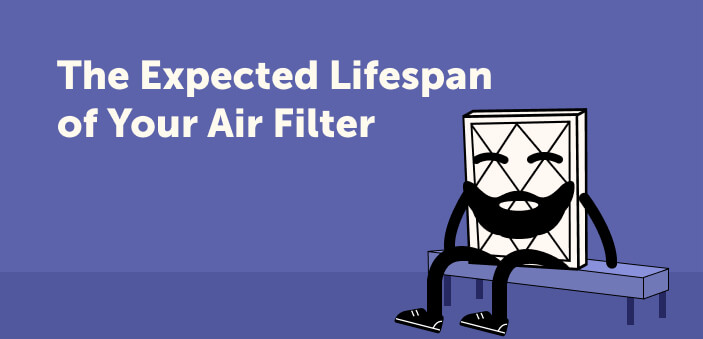
How often you change your air filter will largely be determined by the expected lifespan of the device. Several factors come into play when determining how long an air filter lasts. They include:
1. The Size of your Home
As a general rule, large spaces will create the need to pump more air. On the other hand, smaller rooms will not require much air pumped, which implies less frequency of replacing the filter.
However, there are some exceptions to this rule. These include:
- Other factors (other than your home's size) will create the need to replace an air filter.
- Different home appliances have varying capabilities.
As such, you should not entirely rely on this rule when determining when your air filter needs a replacement.
2. How Often You Use Your Air Filter
The rate at which you use your air filter will determine its lifespan. A home that’s occupied at most times, for example, will require more frequent use of the air conditioning system, and therefore will need filter replacement much sooner compared to a house with no occupants.
Also, the climate in your location will influence how regular you’ll need the air filter working. If you live in a mild climate and your AC runs a few hours a day, one filter could last you several months. On the other hand, if you’re running your AC system nearly 24 hours a day, you’ll need to replace your filter every couple of weeks.
3. The Air Quality Within Your Home
How often you change your air filter also influences air quality, both inside and outside your home. As aforementioned, the presence of pets, young children, and persons with allergies will require you to change your air filter more often.
Simply put, if you have poor air quality outside and inside your home, you'll need to replace your air filter more frequently. There's no doubt changing the filter will lead to more quality air within your home.
Signs Your Air Filter Needs Replacing
It doesn't matter if your AC or HVAC system serves to heat or cool your house; the air circulated eventually has to pass through the filter. As such, there's no clear answer as to how long the air filter can function efficiently before needing a replacement.
Keeping your filter clean by replacing it more often is necessary to keep the device efficient for a long time. However, there are some significant signs that your filter needs a replacement:
- Accumulation of dust around the device's output vents, fan blades, your home's curtain rods, or on nearby tables and cabinets indicates excessive dust circulation.
- A significant loss of your air filter's cooling power.
- The production of excessive noise by your AC system indicates a lot of strain caused by excessive particle accumulation on the device.
You need to take out your air filter after every few weeks and give it a look. If you notice any of the signs above, your filter is definitely in need of a replacement. Failure to do so will reduce efficiency and a possible breakdown of your AC system.
MERV 8 Vs. 11 Vs. 13: Which is Suitable?
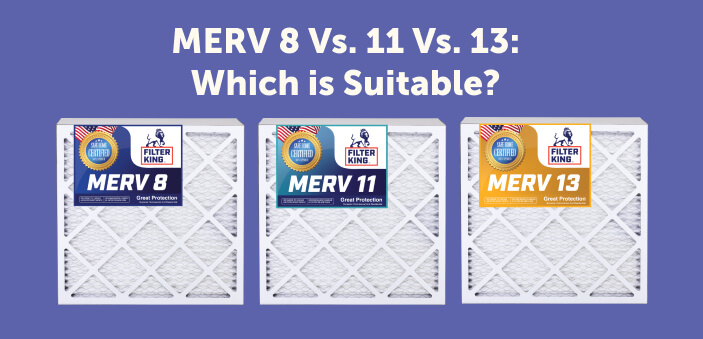
Having discussed in detail how often to change air filter, it's important to know the ideal type of air filter for your needs. Typically, air filters are rated from one to 20. However, we’re going to compare three: MERV 8, 11, and 13.
MERV (Minimum Efficiency Reporting Value) refers to a system used to measure air filter efficiency. It shows the device's capability to attract differently-sized particles from the air. Typically, an air filter with a high MERV rating has more capacity to pick up particles and dust.
In determining the ideal type for your needs, you need to ask yourself the following questions:
- What MERV rating does the air filter have?
- How much pressure drop does it have? (This implies the device's air resistance capabilities)
- Do you own pets? How many?
- Do you have any allergies?
That said, let's look at some of the significant features of these MERV filters and how they are suitable for different needs and users.
MERV 8 Filter
This type of air filter can filter basic particles from the air. This includes dust (pollen and mite dust), mold, and bacteria. It's suitable for users who live in areas with no smoke. Due to its low filtration capability, it's not ideal for use with persons with allergies. It has a relatively low-pressure drop of 0.024 WG.
MERV 11 Filter
This type has similar filtration capabilities to the MERV 8 but with an added efficiency to filter a pet's fur. As such, it's ideal for homeowners with allergies, as well as those who own pets. It has a pressure drop of 0.03 WG, which makes it more efficient than MERV 8.
MERV 13
In addition to filtering particles filtered by MERV 8 and 11, the MERV 13 can filter cooking smoke, smog, and virus carriers. This makes it suitable for persons with several pets or those with severe allergies. It has the highest rated pressure drop of 0.053 WG.
Overall, the ideal MERV filter for your home depends on your needs, plus what you own in your household. For example, the presence of pets and people with allergies require an air filter with a higher MERV rating to pick up more particles.
Improve Your Air Quality for Greater Comfort
You can now tell with confidence how often to change an air filter. By following proper filter replacement schedules, you'll enjoy breathing clean and fresh air and keep yourself healthy.
Filter King is committed to providing the best air quality. Whether it’s filter replacement or installation, we got you covered. Contact us to start breathing the cleanest air today!
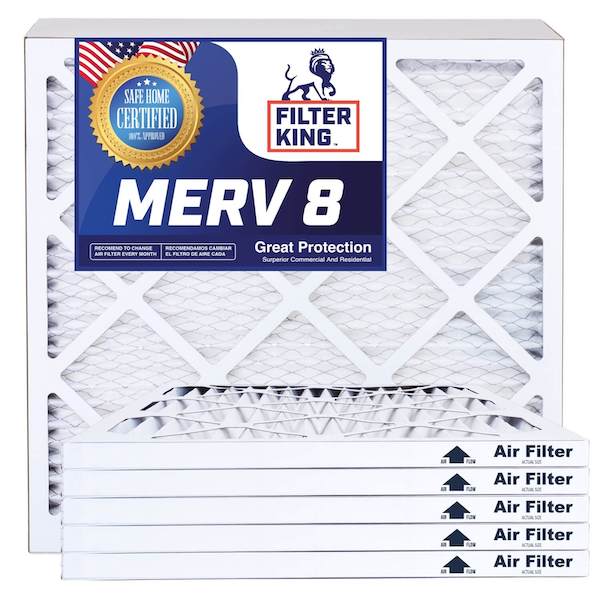 14x18x1
14x18x1

